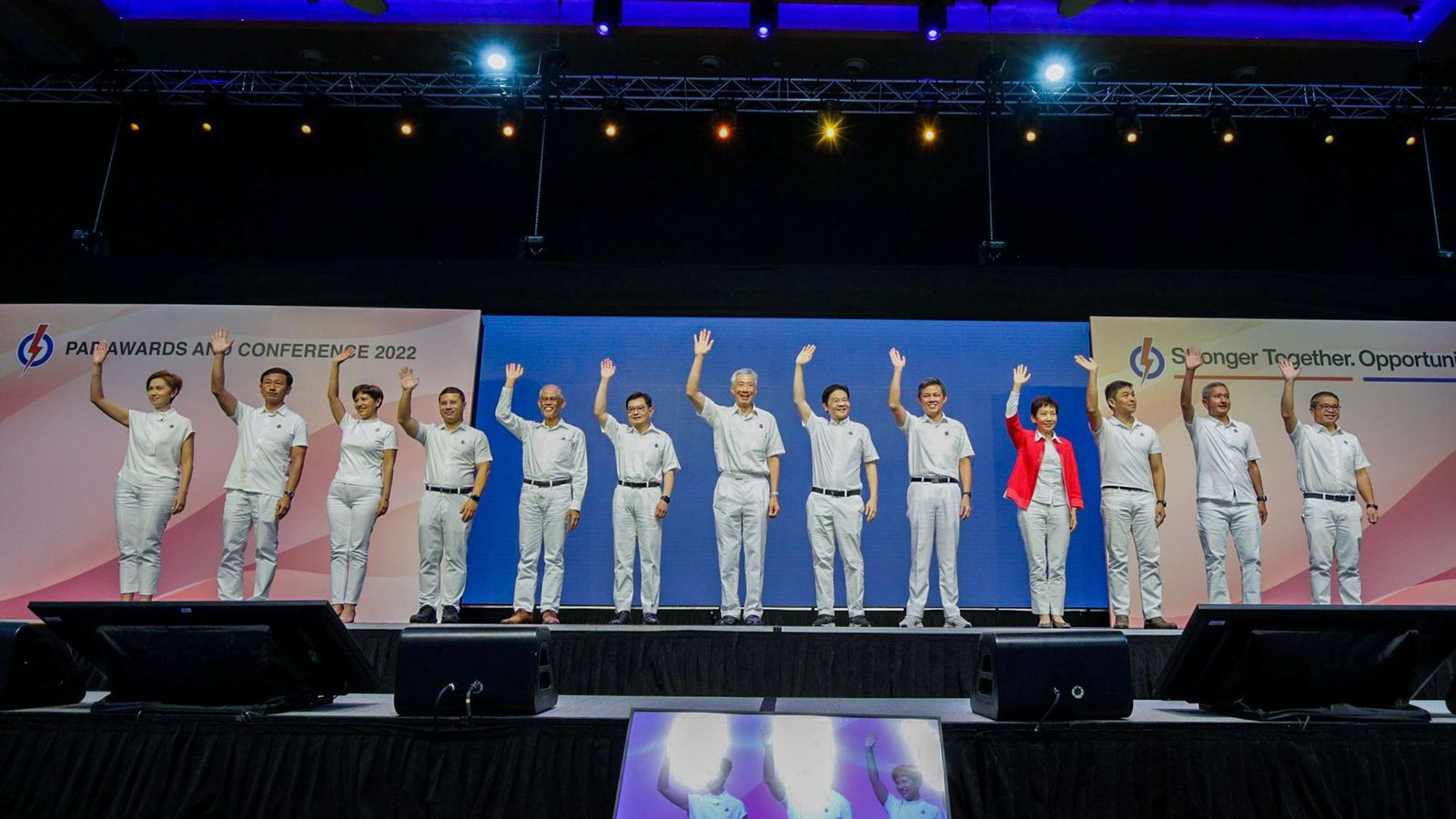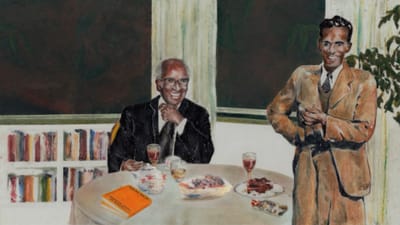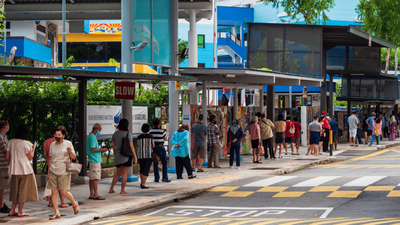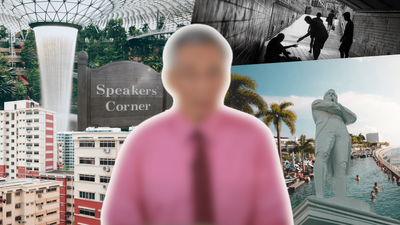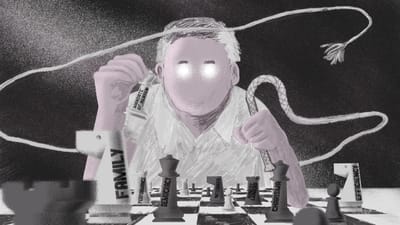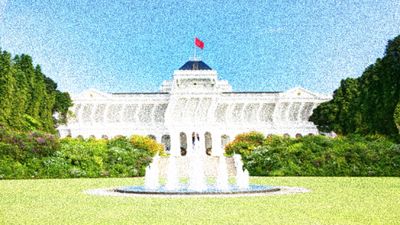Last weekend “comrades” were welcomed by Lawrence Wong, Singapore’s deputy prime minister, to Resorts World Sentosa, a casino-entertainment hub, for the biennial conference of the ruling People’s Action Party (PAP). Its 3,000-odd cadres, in trademark all-white, would not have been out of place amid the Bentleys and Lamborghinis that roar through some of the world’s priciest real estate.
That a party with a Leninist structure and socialist pretences is so comfortable with opulence is a contradiction that Singaporeans have long accepted—as we have the PAP’s political playbook: one based on striking fear into the hearts of voters.
Judging by conference speeches, the PAP’s fourth-generation of leaders (“4G”) will stick to it. Yet, given the electorate’s yearning for greater diversity and debate in society, it appears as if the politics of fear may increasingly be self-defeating.
“Every election from now on will be about which party forms the government,” said Wong, the party’s chosen next leader. This may sound boringly definitional, but in a country where only one party has ruled since independence, it must have been a shock to the faithful.
And cause for observers to roll their eyes. Consider the PAP’s enduring parliamentary supermajority (83-10 of elected seats), electoral rules that favour bigger parties, constant gerrymandering, its dominance of national institutions, its association with government-linked firms run by former politicians and establishment figures, the presence of numerous laws like POFMA (Protection from Online Falsehoods and Manipulation Act) that have had a chilling effect on speech, the presence of two firmly pro-establishment media giants to carry its message, the confinement of the Workers’ Party’s (WP) power base to the east of Singapore (for now), and the dent to the WP’s credibility by the barely believable Raeesah Khan saga.
Even the most bullish opposition supporters think it’ll be at least three or four election cycles, or about 15 years, before the PAP is at risk of losing its parliamentary majority. And yet Wong said that he doesn’t know if he’ll be Singapore’s next prime minister (the next election is due by November 2025). He painted a picture of an opposition on the brink of winning power. Why?
The PAP’s is a survivalist, pragmatist mindset driven by an eternal insecurity about Singapore’s apparent vulnerability. It is one that prizes the presumed efficiency of single-party rule over the supposed messiness of parliamentary democracy.
Thus even as the PAP acknowledges Singaporeans’ desire for stronger checks and balances in Parliament, as Wong again did, and even as it appears to accommodate the opposition, for instance by creating a Leader of the Opposition position after the last election, its instinct, nurtured in the 1960s, is still to obliterate the opposition and monopolise Parliament.
Like the student who got an A- in their last exam, Wong pledged that the PAP would work “doubly hard, triply hard” to win back the seats it had lost.
In order to do this, the leadership emphasised to its cadres, against the backdrop of an uncertain world, three recurring motifs: the opposition is made up of charlatans and opportunists; political diversity might lead to chaos; and single-party dominance is necessary for good governance, especially in times of crises (e.g. a pandemic).
These rallying cries were effectively marching orders to cadres that will soon echo around a community centre near you. It’s worth examining them.
Wong decried the “snake oil” and simplistic solutions of opposition parties that seek a short-term advantage. Lee Hsien Loong, the prime minister, criticised “rabble-rousing” and those who “stir up resentment in order to gain political advantage”.
“They tear relentlessly at fault lines - residents versus foreigners, citizens versus PRs, even old citizens versus new,” he said. “Sometimes they veer into racist territory.”
What they fail to mention is the government’s reluctance to provide data and information when it is sought by opposition politicians. Whether in terms of the development costs of public housing, or demographic data and immigration rates from India—the subject of most alleged “racist” discourse, from Leong Mun Wai of the Progress Singapore Party—the PAP has hampered honest public discourse by withholding data.
Opposition politicians are forced to formulate policies based on limited information, and ask basic questions about citizen and foreigner numbers. In response, the PAP sometimes smears them as, respectively, charlatans or racists.
In attacking parliamentary diversity and debate, Lee criticised liberal democracies such as the US and the UK, while Wong chided “so-called first-world parliaments”. Given those big countries’ very real democratic challenges, they have become favoured punching bags of conservatives here. The PAP pays less attention to the smoother functioning of smaller democracies such as New Zealand, Switzerland and Taiwan–countries more similar to Singapore.
A related argument links single-party dominance to good governance. Lee said that a smaller mandate at the last election would have affected Singapore’s Covid response (which was impressive for citizens, but occasionally abysmal for foreign workers). It is not an argument that holds up to scrutiny, given that feisty, multi-party democracies nearby, such as South Korea and Taiwan, also performed admirably.
In “Why Have the Republic of Korea, Taiwan, and Singapore Coped Well with COVID-19 and What Are the Lessons Learned from Their Experiences?”, medical scholars note four commonalities: recent experience with pandemics (e.g. SARS), advanced technologies, effective “Test, Trace, and Treatment” regimes, and cultural factors that meant citizens followed pandemic orders.
Politics doesn’t warrant a mention. Yet Lee attributes Singapore’s success to single-party rule. It is an old PAP ruse that Singaporeans are increasingly aware of.
If anything, a touch more political diversity might have further improved Singapore’s response. The PAP could have set aside its biases and recruited to its taskforce Paul Tambyah, Singapore’s preeminent infectious disease specialist whose only flaw was being a candidate with the Singapore Democratic Party.
Did the speeches reflect fear mongering or a genuine belief in the party’s decline? “I think the cadres get that it's more rhetoric than anything else,” said a source close to rank-and-file party members. “But also, the reality is that party dominance is under threat. The sense I get is that the older ones are still setting the tone for how the party reacts to things.”
Going by the surfeit of online comments responding to the conference, many others, in particular the coveted Gen Z demographic courted by parties and brands alike, found the all-too-familiar hyperbole a turn off.
A post-election survey in 2020 by the Institute of Policy Studies found that while “the need for good and efficient government” influenced voters the most, political diversity and ideals were increasingly important.
Over the past few years, the PAP has worked hard to spruce up its image on social media and alternative platforms. It has engaged Singaporeans on hitherto taboo topics. For instance, Carrie Tan, a member of parliament, appeared on the Hush podcast with her partner to discuss finding love again after divorce. All this has done much to humanise and soften the image of the PAP, which has often been derided as uncaring and overly technocratic.
However, it remains deeply suspicious of both the opposition and non-government actors who lobby for different social causes, and seeks either to co-opt or discredit them. Wong spoke about the need to “build consensus” though the party’s hierarchical view of society appears intact.
This is not a worldview that accommodates others on an equal footing, nor one with the humility to accept that intelligence is distributed across society. The manner in which Indranee Rajah and Grace Fu, ministers, responded in Parliament this week to Pritam Singh and Jamus Lim of the WP was timely proof that alternative views are treated with disregard, if not disdain.
Even the election of its own Central Executive Committee, which took place at the conference, is an incestuous process, described by one former diplomat as “the cardinals appoint the pope and the pope appoints the cardinals.” The PAP doesn’t even trust democratic processes for its internal workings.
This week’s conference suggests that the PAP still believes that its hegemonic paternalism is vital to Singapore’s success. And that it will continue to deploy fear as an instrument of control.
Perhaps most troubling is the idea that while the playbook itself hasn’t changed, the motivations behind it have. In the 1960s-70s, there was a genuine fear that an inchoate nation-state, in the process of raising living standards for all, might be riven by political differences.
Today there is a worry that fear is being wielded to protect the privilege of a monied elite—whose interests are more aligned to those of global plutocrats and big business than those of the average Singaporean.
Comrades in Sentosa, indeed.
Sudhir Vadaketh is Jom’s editor-in-chief. Nicholas Yong is a veteran Singaporean journalist who has worked across print, broadcast and digital media for 16 years.
If you enjoy Jom’s work, do get a paid subscription today to support independent journalism in Singapore.

